2023届高考英语二轮复习:冠词课件(共17张PPT)
文档属性
| 名称 | 2023届高考英语二轮复习:冠词课件(共17张PPT) | 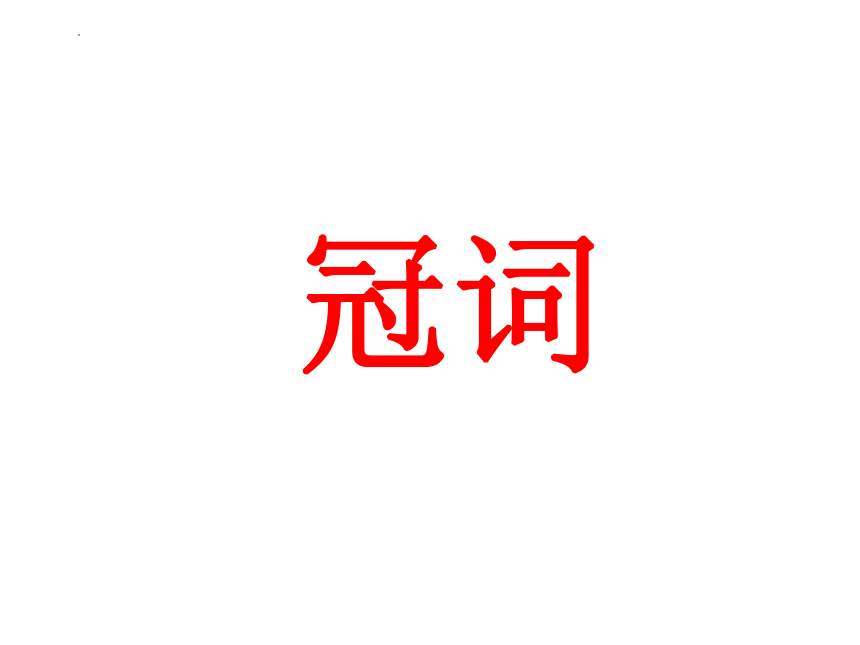 | |
| 格式 | pptx | ||
| 文件大小 | 67.2KB | ||
| 资源类型 | 教案 | ||
| 版本资源 | 通用版 | ||
| 科目 | 英语 | ||
| 更新时间 | 2022-11-04 12:53:31 | ||
图片预览

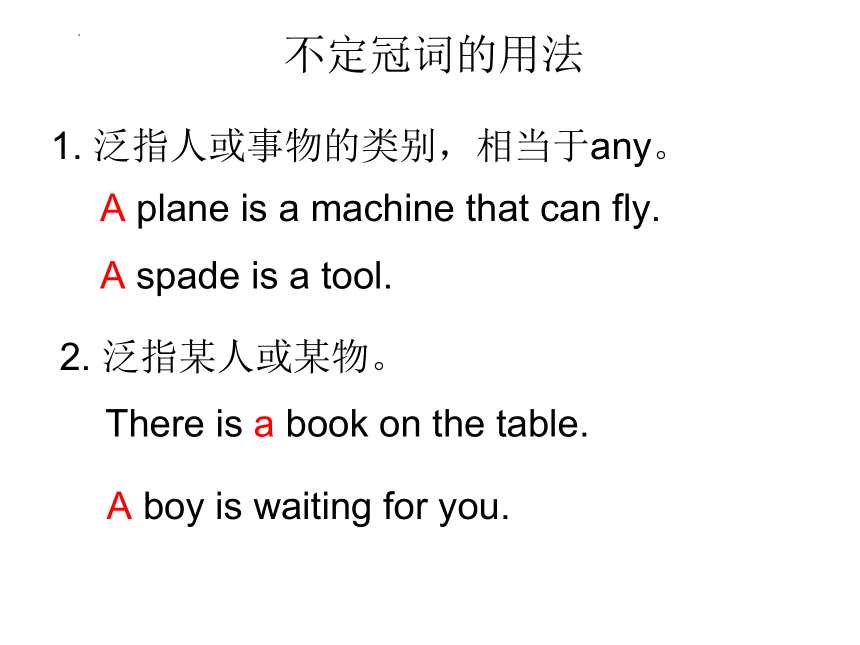
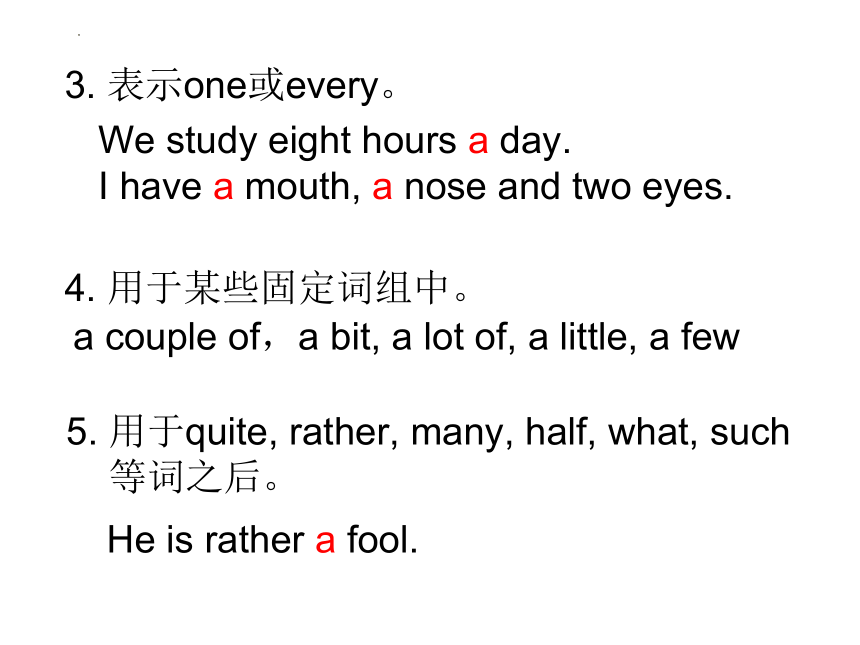
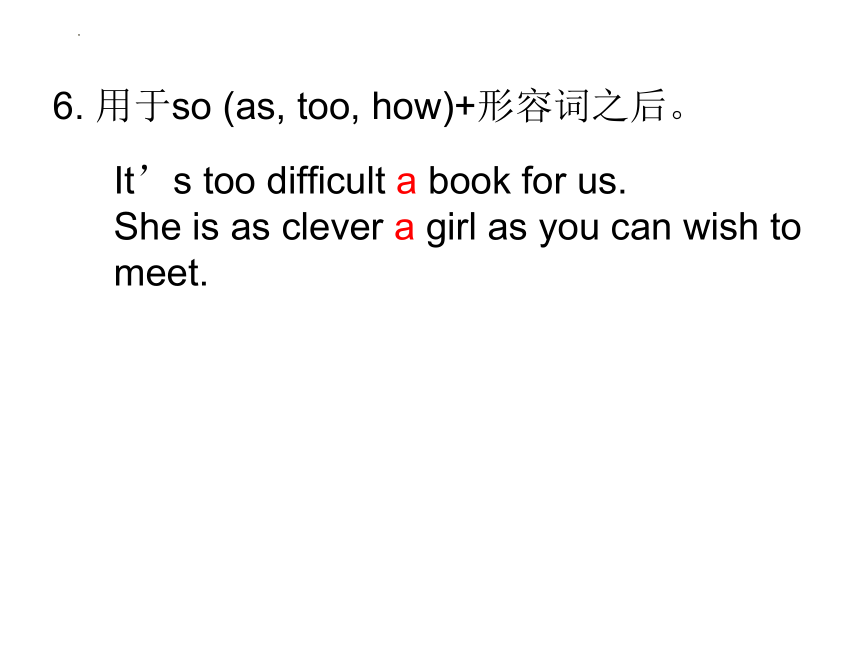
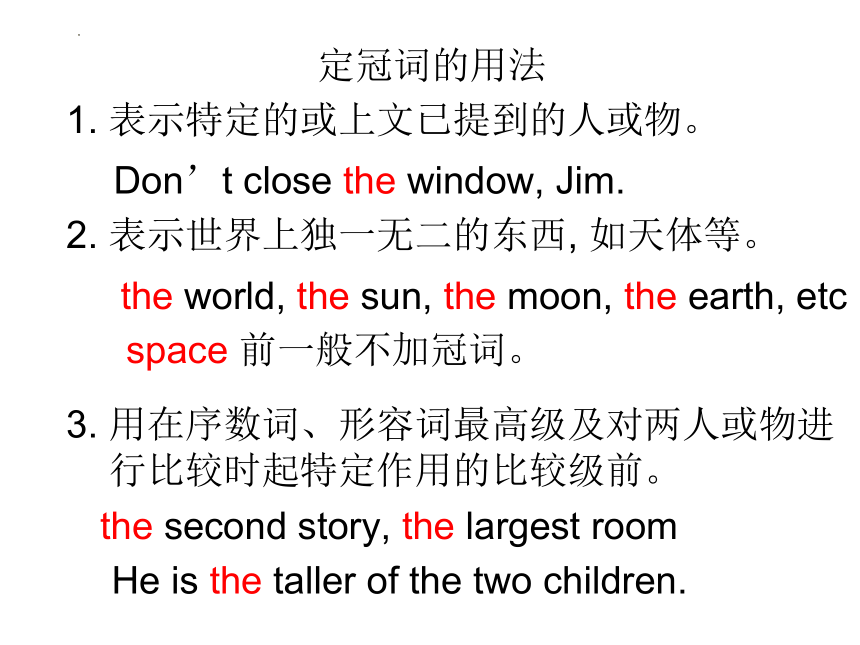
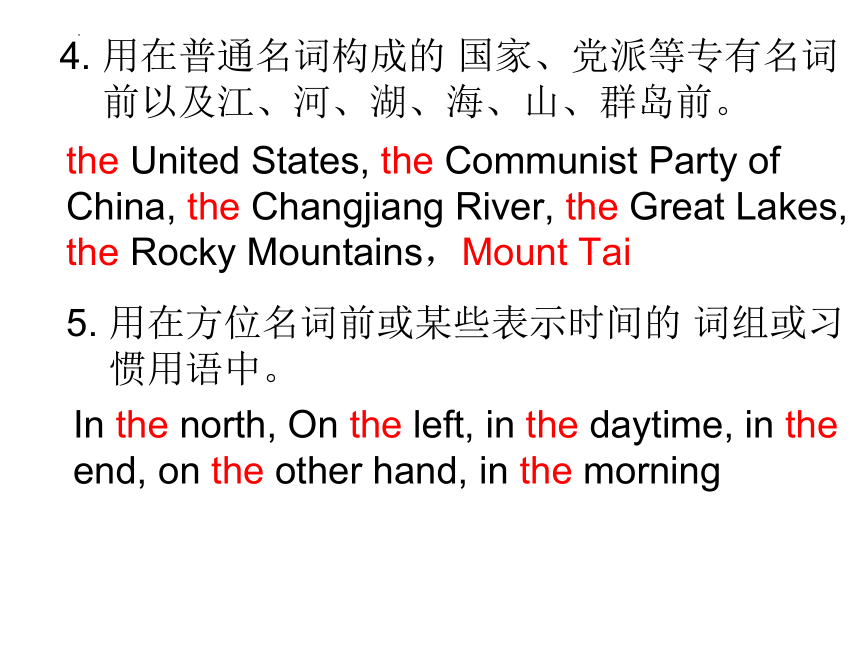
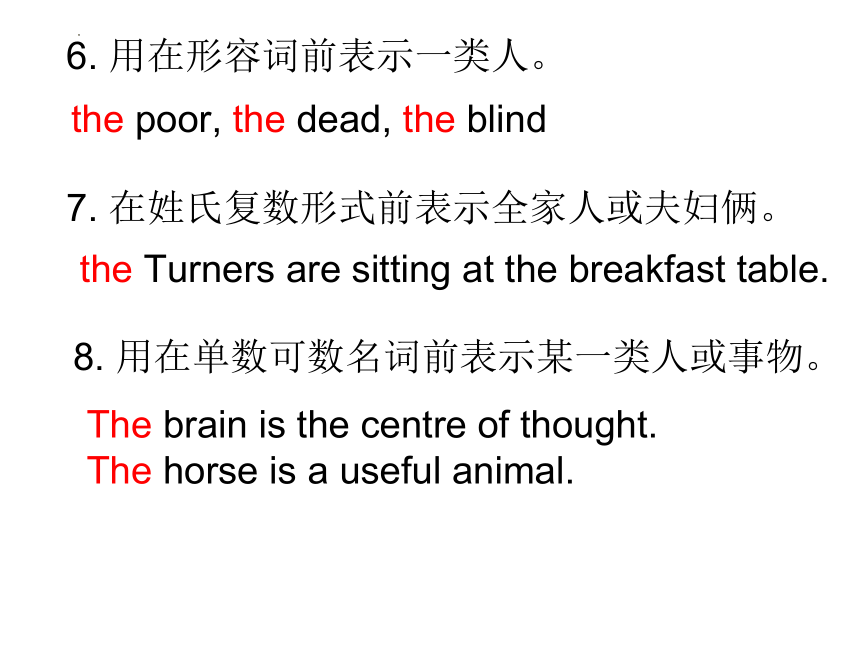
文档简介
(共17张PPT)
冠词
不定冠词的用法
1. 泛指人或事物的类别,相当于any。
A plane is a machine that can fly.
A spade is a tool.
2. 泛指某人或某物。
There is a book on the table.
A boy is waiting for you.
3. 表示one或every。
We study eight hours a day.
I have a mouth, a nose and two eyes.
4. 用于某些固定词组中。
a couple of,a bit, a lot of, a little, a few
5. 用于quite, rather, many, half, what, such
等词之后。
He is rather a fool.
6. 用于so (as, too, how)+形容词之后。
It’s too difficult a book for us.
She is as clever a girl as you can wish to meet.
定冠词的用法
1. 表示特定的或上文已提到的人或物。
2. 表示世界上独一无二的东西, 如天体等。
Don’t close the window, Jim.
3. 用在序数词、形容词最高级及对两人或物进
行比较时起特定作用的比较级前。
the second story, the largest room
He is the taller of the two children.
the world, the sun, the moon, the earth, etc
space 前一般不加冠词。
4. 用在普通名词构成的 国家、党派等专有名词
前以及江、河、湖、海、山、群岛前。
the United States, the Communist Party of China, the Changjiang River, the Great Lakes, the Rocky Mountains,Mount Tai
5. 用在方位名词前或某些表示时间的 词组或习
惯用语中。
In the north, On the left, in the daytime, in the end, on the other hand, in the morning
6. 用在形容词前表示一类人。
the poor, the dead, the blind
7. 在姓氏复数形式前表示全家人或夫妇俩。
the Turners are sitting at the breakfast table.
8. 用在单数可数名词前表示某一类人或事物。
The brain is the centre of thought.
The horse is a useful animal.
9. 乐器前通常加定冠词
Do you like to play the piano or the violin
10. 指世纪的某个年代
In the 1870’s, when Marx was already in his fifties…
11. 在表示发明物的单数名词前
The compass was invented in China four thousand years ago.
12. 在有些关于国家和民族的形容词前加上定冠
词,可以泛指这个国家和民族的全体人
员,这些形容词是以sh, ch, ese结尾的。
the Japanese, the Chinese, the French,
the Scotch, the English, the Welsh, the Irish
1. 专有名词、物质名词、抽象名词、人名、地名前一般不加冠词。
Beijing Railway Station, Zhong Shan Park, Smith, America, China
Air is matter.
不用冠词
但是,当抽象名词或物质名词被限定时,前面要加the
The milk in the bottle has gone bad.
抽象名词或物质名词前或后加上表示其特殊性质或类别的修饰词,指“一种”、“一类”、“一次”等时,可用不定冠词,但不用定冠词。
After a swim, she had a rest.
Physics is a science.
It’s a pleasure to go with you.
She is a great help to me.
I have a good knowledge of English.
2. 可数名词前有物主代词、指示代词、不定代词、名词所有格等限制时,不加冠词。
This book is mine.
3. 季节、月份、星期、西方节日、假日、一日三餐前不加冠词。
May, May Day, Sunday, National Day, Children’s Day, Women’s Day
Spring is the best season of the year.
Have you had supper
如果月份等被一个限定性定语修饰,加冠词。
He joined the Army in the spring of 1992.
4. 称呼语及表示头衔职务的名词作宾语、补语、同位语时
Lincoln was made President of the US.
What’s this, Mother
Premier Zhou, Professor Liu
5. 学科名称、球类、棋类名词前
Do you study mathematics
He likes playing football/chess.
6. 表示泛指的复数名词前
They are workers.
7. 在与by连用的交通工具名称前
by train, by bike, by bus, by car
take a bus, come in a boat, on the train
8. 表示语言的名词前
French, English, Chinese
the Chinese language, the English language
9. 在turn后作补语的名词前
He was a medical student before he turned writer.
10. 在一个以“普通名词(或形容词最高级)+as”开始的让步状语从句中
Shortest though he is, he runs fastest in our class.
Boy as he is, he knows a lot.
11. 在若干独立结构中
He entered the forest, gun in hand.
12. 某些固定词组前
1)成对使用的词组
husband and wife, young and old, hand in hand, sun and moon, bread and butter, knife and fork
2)介词词组:
to (at, from) school, in (to) class, in (to, at, from) university (college), to (in, into, from) church, to (in, into, out of) prison (hospital, bed), at night (noon, midnight), to (at) sea, by car (bus, bicycle, plane)
注意:有些词组中有没有冠词含义不同
Make the bed 整理床铺
Make beds 制作床
At table 在进餐时
At the (a) table 在桌子旁
Out of question 不成问题
Out of the question 根本不可能
In front of 在…前面
In the front of 在…的前部
in hospital
In the hospital
冠词
不定冠词的用法
1. 泛指人或事物的类别,相当于any。
A plane is a machine that can fly.
A spade is a tool.
2. 泛指某人或某物。
There is a book on the table.
A boy is waiting for you.
3. 表示one或every。
We study eight hours a day.
I have a mouth, a nose and two eyes.
4. 用于某些固定词组中。
a couple of,a bit, a lot of, a little, a few
5. 用于quite, rather, many, half, what, such
等词之后。
He is rather a fool.
6. 用于so (as, too, how)+形容词之后。
It’s too difficult a book for us.
She is as clever a girl as you can wish to meet.
定冠词的用法
1. 表示特定的或上文已提到的人或物。
2. 表示世界上独一无二的东西, 如天体等。
Don’t close the window, Jim.
3. 用在序数词、形容词最高级及对两人或物进
行比较时起特定作用的比较级前。
the second story, the largest room
He is the taller of the two children.
the world, the sun, the moon, the earth, etc
space 前一般不加冠词。
4. 用在普通名词构成的 国家、党派等专有名词
前以及江、河、湖、海、山、群岛前。
the United States, the Communist Party of China, the Changjiang River, the Great Lakes, the Rocky Mountains,Mount Tai
5. 用在方位名词前或某些表示时间的 词组或习
惯用语中。
In the north, On the left, in the daytime, in the end, on the other hand, in the morning
6. 用在形容词前表示一类人。
the poor, the dead, the blind
7. 在姓氏复数形式前表示全家人或夫妇俩。
the Turners are sitting at the breakfast table.
8. 用在单数可数名词前表示某一类人或事物。
The brain is the centre of thought.
The horse is a useful animal.
9. 乐器前通常加定冠词
Do you like to play the piano or the violin
10. 指世纪的某个年代
In the 1870’s, when Marx was already in his fifties…
11. 在表示发明物的单数名词前
The compass was invented in China four thousand years ago.
12. 在有些关于国家和民族的形容词前加上定冠
词,可以泛指这个国家和民族的全体人
员,这些形容词是以sh, ch, ese结尾的。
the Japanese, the Chinese, the French,
the Scotch, the English, the Welsh, the Irish
1. 专有名词、物质名词、抽象名词、人名、地名前一般不加冠词。
Beijing Railway Station, Zhong Shan Park, Smith, America, China
Air is matter.
不用冠词
但是,当抽象名词或物质名词被限定时,前面要加the
The milk in the bottle has gone bad.
抽象名词或物质名词前或后加上表示其特殊性质或类别的修饰词,指“一种”、“一类”、“一次”等时,可用不定冠词,但不用定冠词。
After a swim, she had a rest.
Physics is a science.
It’s a pleasure to go with you.
She is a great help to me.
I have a good knowledge of English.
2. 可数名词前有物主代词、指示代词、不定代词、名词所有格等限制时,不加冠词。
This book is mine.
3. 季节、月份、星期、西方节日、假日、一日三餐前不加冠词。
May, May Day, Sunday, National Day, Children’s Day, Women’s Day
Spring is the best season of the year.
Have you had supper
如果月份等被一个限定性定语修饰,加冠词。
He joined the Army in the spring of 1992.
4. 称呼语及表示头衔职务的名词作宾语、补语、同位语时
Lincoln was made President of the US.
What’s this, Mother
Premier Zhou, Professor Liu
5. 学科名称、球类、棋类名词前
Do you study mathematics
He likes playing football/chess.
6. 表示泛指的复数名词前
They are workers.
7. 在与by连用的交通工具名称前
by train, by bike, by bus, by car
take a bus, come in a boat, on the train
8. 表示语言的名词前
French, English, Chinese
the Chinese language, the English language
9. 在turn后作补语的名词前
He was a medical student before he turned writer.
10. 在一个以“普通名词(或形容词最高级)+as”开始的让步状语从句中
Shortest though he is, he runs fastest in our class.
Boy as he is, he knows a lot.
11. 在若干独立结构中
He entered the forest, gun in hand.
12. 某些固定词组前
1)成对使用的词组
husband and wife, young and old, hand in hand, sun and moon, bread and butter, knife and fork
2)介词词组:
to (at, from) school, in (to) class, in (to, at, from) university (college), to (in, into, from) church, to (in, into, out of) prison (hospital, bed), at night (noon, midnight), to (at) sea, by car (bus, bicycle, plane)
注意:有些词组中有没有冠词含义不同
Make the bed 整理床铺
Make beds 制作床
At table 在进餐时
At the (a) table 在桌子旁
Out of question 不成问题
Out of the question 根本不可能
In front of 在…前面
In the front of 在…的前部
in hospital
In the hospital
